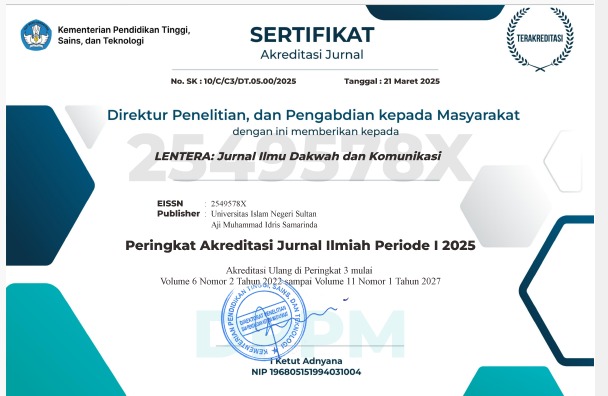Intercultural Communication in the Implementation of Multicultural Education Performed by Islamic Religion Education Teachers of Senior High Schools
Abstract
The occurrence of intercultural communication in multicultural education is indicated by the sense of equality in the education process, regardless of ethnicity, social class and the gender of the students. The dynamics of Islamic Religion Education, which was executed through an approach so-called ‘multicultural education’, combines traditions and learning process. Thus, the teachers were supposed to be the communicators who underline some particular factors such as readiness and empathy. The aim of this paper, therefore, is to describe the dynamics of intercultural communication in the settings of multicultural education performed by High School’s Islamic Religion Education (PAI) teachers in Makassar. This qualitative study found that teacher’s readiness was changing every time they taught another class with another academic major. A practical approach was the one preferred by the students of all kinds of academic majors, unlike the discussion and lecture approach. The other finding of this study was that teachers were more likely to show cognitive empathy rather than affective empathy.
Keywords: Intercultural Communication, Multicultural Education, Islamic Religion Education
References
Budyatna, Muhammad, (2012), Komunikasi Bisnis Silang Budaya, Jakarta: Prenada.
Creswell, John W., (2009) Research Design: Qualitative, Quantitative, and Mixed Methods Approaches, Thousand Oaks California: Sage Publications.
Gudykunst, William B. (editor) (2005) Theorizing about Intercultural Communication, London: Sage Publications.
Hennink, Monique, Hutter, Inge, Bailey, Ajay, (2011), Qualitative Research Methods, California: Sage Publications.
Liliweri, Alo (2003), Dasar-dasar Komunikasi Antarbudaya,Yogyakarta: Pustaka Pelajar.
Nuryatno, M. Agus (2008), Mazhab Pendidikan Kritis: Menyikap Relasi Pengetahuan, Politik, dan Kekuasaan, Yogyakarta: Resist Book.
Mahfud, Chairul, (2013), Pendidikan Multikultural, Yogyakarta: Pustaka Pelajar.
Martin, Judith N., Nakayama, Thomas K., (2007) Intercultural Communication in Contexts, Boston: McGraw Hill.
Matthew B. Miles dan A. Michael Huberman (terjemahan) (2014) Analisis Data Kualitatif, Jakarta: UIP.
Purwasito, Andrik, (2015), Komunikasi Multikultural, Jakarta: Pustaka Pelajar.
Ruben, Brent D., Stewart, Lea P., (2006), Communication and Human Behavior, USA: Pearson.
Ruslan Ibrahim, Pendidikan Multikultural: Upaya Meminimalisir Konflik dalam Era Pluralitas Agama, Jurnal Pendidikan Islam el-Tarbawi, Volume 1, Nomor 1, 2008. DOI: https://doi.org/10.20885/tarbawi.voll.issl.art9.
Samovar, Larry A., Porter, Richard E., McDaniel, Edwin R, (2010) Communication Between Cultures, Singapore: Cengage Learning.
Sapendi, Internalisasi Nilai-Nilai Multikultural dalam Pembelajaran Pendidikan Agama Islam di Sekolah (Pendidikan Tanpa Kekerasan), Jurnal Studi Gender dan Anak Raheema. DOI: https://doi.org/10.24260/raheema.v2i1.172
Saprillah, dkk (2017), Multikulturalisme dan Problem Keagamaan masyarakat Urban, Yogyakarta: Lintas Nalar.
Senjaya, S. Djuarsa dkk, (1997), Teori Komunikasi, Jakarta: Universitas Terbuka
Sobur, Alex, (2016), Psikologi Umum, Bandung: Pustaka Setia.
Taufik, (2017), Empati, Pendekatan Psikologi Sosial, Depok: Rajawali Pers.
Yilmas, Fatih, Multiculturalism and Multicultural Education: A Case Studi of Teacher Candidates’ Perceptions, Cogent Education 2016. DOI: http://dx.doi.org/10.1080/2331186x.2016.117394
Zainiyati, Husniyatus Salamah Pendidikan Multikultural: Upaya Membangun Keberagamaan Inklusif di Sekolah, Jurnal Islamica, Volume 1, Nomor 2, Maret 2007. DOI: https://doi.org/10.15642/islamica.2007.1.2.135-145
https://sp2010.bps.go.id/index.php/site/tabel?tid=321&wid=0
Copyright (c) 2019 LENTERA

This work is licensed under a Creative Commons Attribution-ShareAlike 4.0 International License.
Penulis yang menerbitkan artikel di Lentera: Jurnal Ilmu Dakwah dan Komunikasi setuju dengan ketentuan berikut:
- Penulis memiliki hak cipta artikel dan memberikan hak jurnal untuk publikasi pertama dengan karya yang secara simultan dilisensikan di bawah CC-BY-SA atau The Creative Commons Attribution – ShareAlike Licence.
- Penulis dapat membuat perjanjian kontrak tambahan yang terpisah untuk distribusi non-eksklusif versi jurnal yang diterbitkan dari karya tersebut (misalnya, mempostingnya ke repositori institusional atau menerbitkannya dalam sebuah buku), dengan pengakuan atas publikasi awalnya di jurnal ini.
- Penulis diizinkan dan didorong untuk memposting pekerjaan mereka secara online (misalnya, dalam repositori institusional atau di situs web mereka) sebelum dan selama proses pengajuan, karena dapat menyebabkan pertukaran yang produktif, serta kutipan yang lebih awal dan lebih besar dari karya yang diterbitkan (Lihat The Effect of Open Access)
Authors who publish articles in Lentera: Jurnal Ilmu Dakwah dan Komunikasi agree to the following terms:
- Authors retain copyright of the article and grant the journal right of first publication with the work simultaneously licensed under a CC-BY-SA or The Creative Commons Attribution–ShareAlike License.
- Authors are able to enter into separate, additional contractual arrangements for the non-exclusive distribution of the journal's published version of the work (e.g., post it to an institutional repository or publish it in a book), with an acknowledgment of its initial publication in this journal.
- Authors are permitted and encouraged to post their work online (e.g., in institutional repositories or on their website) prior to and during the submission process, as it can lead to productive exchanges, as well as earlier and greater citation of published work (See The Effect of Open Access).












.png)
